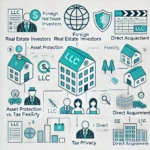Introduction:
The U.S. real estate market continues to be a beacon of opportunity for international investors, offering a unique combination of stability, appreciation potential and portfolio diversification. With a transaction volume of $54.4 billion in residential properties purchased by international investors between April 2022 and March 2023, according to the National Association of Realtors, the appeal of this market remains strong, even in the face of global challenges.
In this comprehensive guide, we’ll explore the nuances of real estate investing in the US, from basic strategies to advanced considerations, providing international investors with the tools they need to successfully navigate this dynamic and complex market.
Part 1: Ready to Roll 🚀 – Basic Strategies and Practical Actions
Part 1, “Ready to Roll”, offers practical actions and immediate advice for entrepreneurs who need quick and effective guidance.

1. Overview of the American Real Estate Market
Current Trends
- Growth of secondary markets (Austin, Nashville, Raleigh)
- Increasing demand for single-family homes in suburban areas
- Expansion of the rental market due to escalating real estate prices
Opportunities for International Investors
- Portfolio diversification and hedging against currency fluctuations
- Rental income potential in markets with high demand
- Capital appreciation in growing cities
2. Basic Investment Strategies
Residential Investment
- Single-family homes:
- Ideal for long-term rental or resale after appreciation
- Target markets: suburbs of large cities, growing medium-sized cities
- Condominiums:
- Popular in urban areas, potential for short-term rentals
- Focus on cities with strong tourism or business centers
- Multifamily:
- Apartment buildings for operational efficiency
- Target markets: university areas, expanding urban centers
Basic Commercial Investment
- Retail spaces:
- Focus on properties with core tenants (pharmacies, supermarkets)
- Consider the impact of e-commerce on demand for physical space
- Small Offices:
- Opportunities in cities with job growth in the service sector
- Pay attention to the trend towards remote working and flexible spaces
3. Key legal aspects
Basic ownership structures
- Direct ownership:
- Simple, but with legal and fiscal exposure
- Suitable for smaller investments or novice investors
- LLC (Limited Liability Company):
- Offers legal protection and tax flexibility
- Recommended for most international investors
Essential Legal Considerations
- Importance of due diligence to check titles and zoning
- Need for well-drafted contracts reviewed by specialized lawyers
- Verification of licenses and permits, especially for rental properties
4. Basic Tax Aspects
Property taxes
- Vary significantly between states and municipalities
- Significant impact on return on investment
Basic Income Tax
- Rental income is taxable in the US
- Possibility of deducting operating expenses and depreciation
FIRPTA (Foreign Investment in Real Property Tax Act)
- 15% withholding tax on the sale price for foreign investors
- Importance of proper tax planning
5. Initial Financing
Basic Options for International Investors
- Cash payment:
- Simplifies the process, but limits purchasing power
- Ideal for investors with large amounts of available capital
- Basic bank financing:
- Available, but with generally less favorable conditions for foreigners
- Substantial deposits and extensive documentation required
- Seller Financing:
- Flexible alternative, especially useful for smaller commercial properties
- Direct negotiation with the seller, potentially more accessible to foreigners
6. Property Management – Getting Started
Initial Challenges for International Investors
- Geographical distance as an obstacle to direct management
- Cultural and legal differences in interaction with tenants
Basic solutions
Basic remote investment monitoring
Property management companies:
Fundamental for investors who cannot be physically present
Basic technology:
Use of simple remote management platforms
Basic remote investment monitoring
Part 2: Deep Dive 🤿 – Technical Depth in Advanced Strategies
Part 2, “Deep Dive”, provides in-depth analysis for those who wish to delve into the technical and complex aspects of international finance.

7. In-depth Analysis of Markets and Trends
Micromarkets and Neighborhood Analysis
- Use of big data to identify appreciation trends in specific neighborhoods
- Detailed demographic analysis to predict changes in housing demand
Impact of Mega Trends
- Assessing the impact of climate change on the valuation of coastal properties
- Analysis of the effect of automation and AI on the office and industrial space market
8. Advanced Investment Strategies
Value-Add Investments
- Identification of undervalued properties with potential for improvement
- Renovation and repositioning strategies to maximize returns
Land Development
- Analysis of zoning and urban development opportunities
- Strategies to navigate approval and construction processes
Specialized Niche Investments
- Student residences:
- Focus on university cities with enrollment growth
- Analysis of distance education trends and their impact
- Medical Facilities:
- Opportunities in markets with an aging population
- Considerations on the impact of telemedicine
- Data centers:
- Evaluating sites with optimal power and connectivity infrastructure
- Analysis of growing demand for data storage and cloud computing
9. Advanced legal and tax structuring
Complex Corporate Structuring Strategies
- Use of Offshore Holdings:
- Advantages and risks of structures in low-tax jurisdictions
- Compliance with regulations such as FATCA and CRS
- Layered Structures:
- Creation of separate LLCs for each property or group of properties
- Strategies for risk isolation and tax optimization
Sophisticated international tax planning
- Use of tax treaties to minimize double taxation
- Step-up in basis strategies to reduce capital gains
- Exit planning and profit repatriation
10. Advanced Financing and Leveraging
Complex Financing Strategies
- Mezzanine financing:
- Using subordinated debt to increase leverage
- Risk-return analysis in complex capital structures
- Real estate crowdfunding:
- Participation in collective investment platforms
- Regulatory and operational risk assessment
- Equity partnerships:
- Structuring joint ventures with local investors
- Negotiating partnership terms and exit strategies
Foreign exchange risk management
- Use of hedging instruments to protect against dollar fluctuations
- Multi-currency financing strategies
11. Advanced Due Diligence and Risk Analysis
In-depth Environmental Assessment
- Analysis of contamination risks and remediation costs
- Sustainability considerations and green certifications
Geopolitical and Economic Risk Analysis
- Evaluation of the impact of government policies on real estate valuation
- Analysis of economic scenarios and their effect on regional real estate markets
Technological due diligence
- Assessment of the technological infrastructure of commercial properties
- Analysis of the potential to adapt to future technologies (e.g. 5G, IoT)
12. Portfolio Management and Exit Strategies
Portfolio optimization
- Use of quantitative models to balance risk and return
- Geographical and asset type diversification strategies
Strategic exit planning
- Analysis of exit options: outright sale, refinancing, REIT IPO
- Market timing and strategies for maximizing value when selling
13. Technology and Innovation in Real Estate Investment
PropTech and its Impact
- Use of AI and machine learning in property selection and management
- IoT implementation for operational optimization in commercial properties
Blockchain and Tokenization of Real Estate Assets
Legal and regulatory considerations in the tokenization of real assets
Analysis of opportunities in property fractionation via tokens
Conclusion
international investors, from basic purchase and rental strategies to complex portfolio structuring and project development. The key to success in this market lies in combining a deep understanding of local dynamics with a global strategic vision.
To effectively navigate this landscape, international investors must:
- Develop a solid understanding of the fundamentals of the American real estate market.
- Be prepared to adapt their strategies to rapidly changing market and technological trends.
- Build a robust network of local professionals, including lawyers, accountants and property managers.
- Stay up-to-date on regulatory and tax changes that may impact your investments.
- Adopt a long-term approach, balancing capital appreciation opportunities with stable cash flow.
With careful planning, rigorous due diligence and a strategic approach, international investors can not only capitalize on opportunities in the US real estate market, but also build a resilient and profitable portfolio that transcends borders and economic cycles.
FAQs
1: What are the main risks for international investors in the US real estate market? A: The main risks include currency fluctuations, changes in immigration and foreign investment laws, variations in local markets, and challenges in remote management. It is crucial to have a robust risk mitigation strategy.
2: How does the recent global economic volatility affect real estate investment in the US? A: Volatility can create both challenges and opportunities. Unstable markets can lead to attractive pricing, but they also increase risks. Diversification and a long-term approach are essential.
3: What are the specific considerations for investors seeking residency or citizenship through real estate investment? A: Programs like EB-5 have specific investment and job creation requirements. It is crucial to work with specialized immigration attorneys and fully understand the requirements and risks involved.
4: How is climate change impacting real estate investment decisions in the US? A: Climate risks are becoming an increasingly important consideration, affecting everything from site selection to property design and insurance. Investors are prioritizing resilient and sustainable properties.
5: What is the expected impact of new technologies, such as AI and blockchain, on the American real estate market? A: These technologies are transforming many aspects of the sector, from market analysis and property valuation to management and transactions. Investors must be prepared to adopt and adapt to these innovations in order to remain competitive.

Member of the IMA (Institute of Management Accountants) – USA
Member of the AICPA (American Institute of CPAs) – USA
Member of AAII (American Association of Individual Investors) – USA
Member of AAA (American Accounting Association) – USA
Member of the FMA (Financial Management Association) – USA
These associations not only attest to Kleyton’s commitment to professional excellence, but also ensure that his knowledge is always at the forefront of international financial and accounting practices.
With a robust academic background, including a Bachelor’s degree in Accounting and MBAs in International Finance and Accounting, as well as in International Business, Kleyton offers a unique and comprehensive perspective on the global business landscape.
Through the Tartarotti Report, Kleyton invites visionary entrepreneurs and executives to connect, explore opportunities for collaboration and, together, successfully navigate the complex world of international corporate finance.







